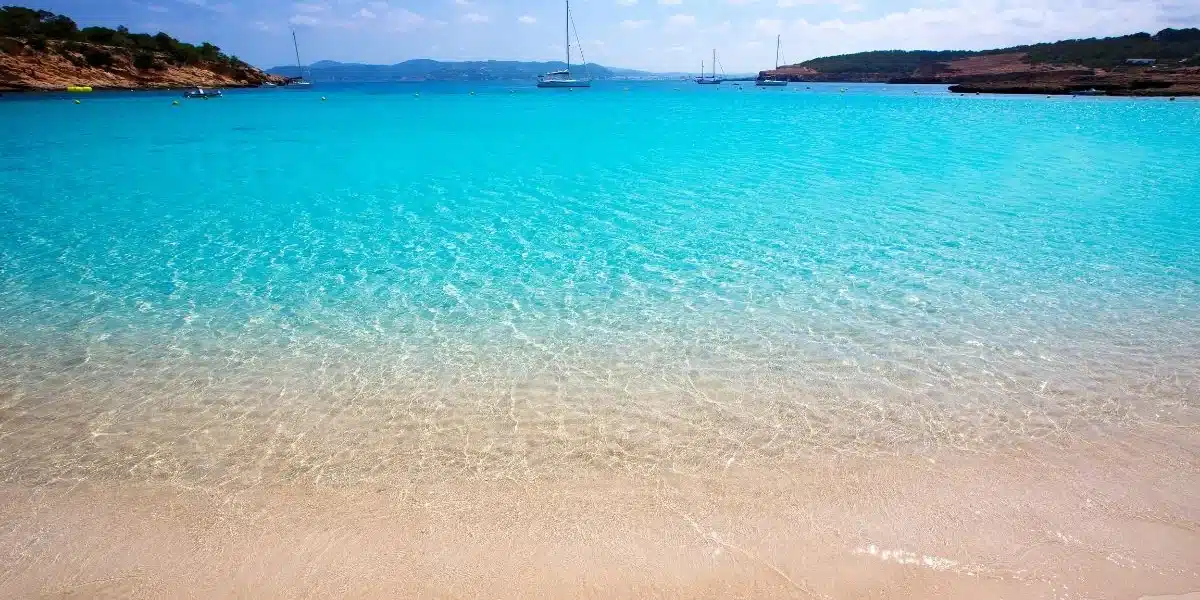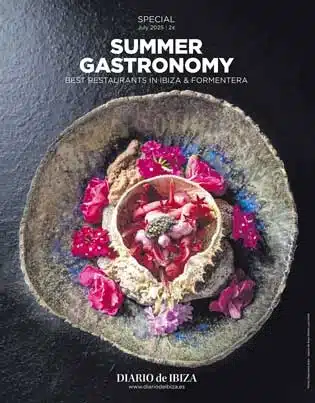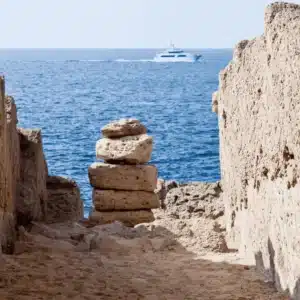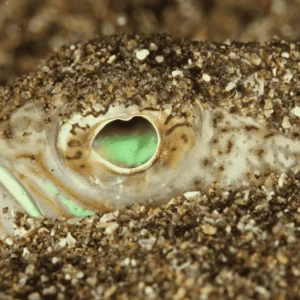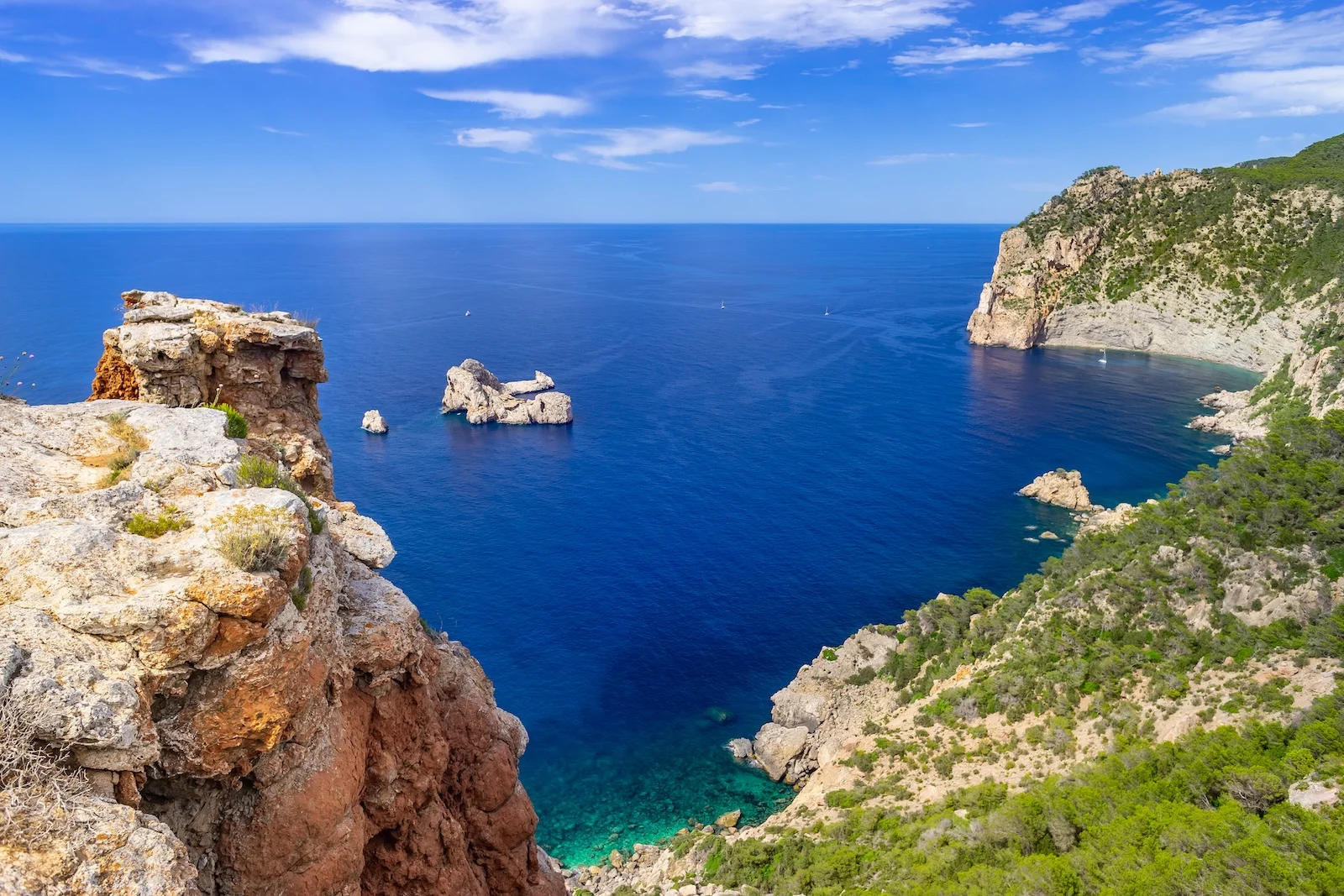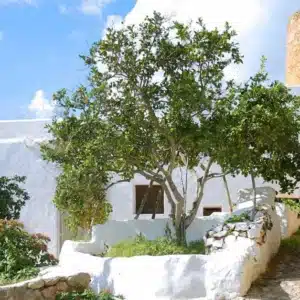One of Ibiza’s most mesmerising features is its crystalline blue waters, which attract visitors from around the world. The striking blue hue of the sea around Ibiza is not just a visual treat but also a result of several environmental and geographical factors that combine to create the island’s distinctive maritime allure.
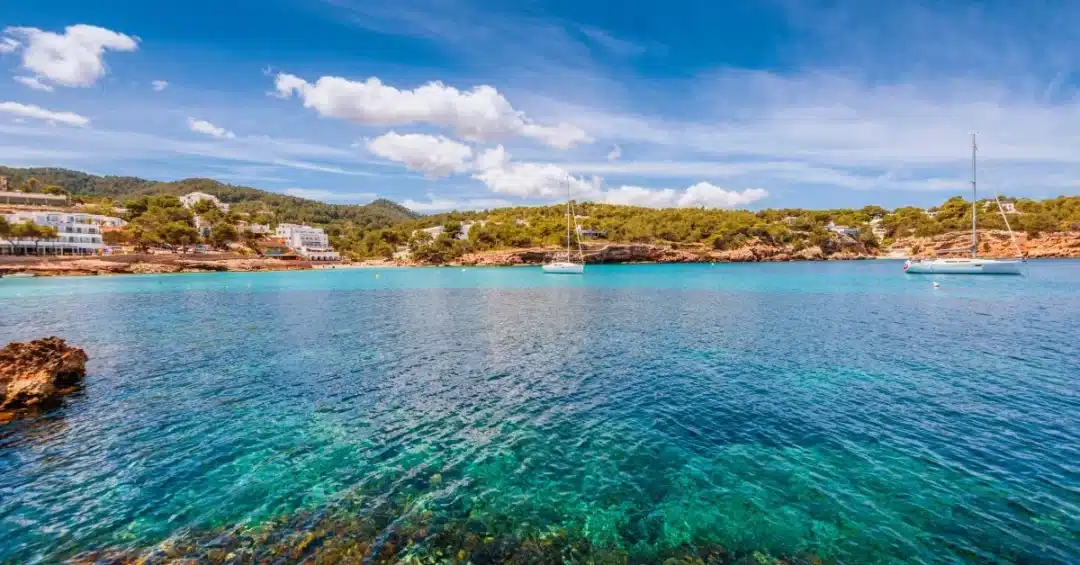
1. Posidonia Oceanica: Ibiza’s underwater architect
One of the most important contributors to the vivid blue of Ibiza’s waters is an underwater plant called Posidonia oceanica. Often mistaken for seaweed, Posidonia is actually a type of seagrass that thrives in the Mediterranean’s shallow coastal waters. It forms dense underwater meadows that have a profound impact on the clarity and colour of the surrounding sea.
Posidonia plays several crucial roles in maintaining the health of the marine ecosystem. One of its primary functions is to filter the water, trapping particles and sediments that would otherwise cloud the sea. This filtration helps the water appear much clearer and bluer. Additionally, the presence of Posidonia prevents sand and other materials from being stirred up from the seabed, maintaining the water’s clarity even in areas with heavy boat traffic or where waves frequently break.
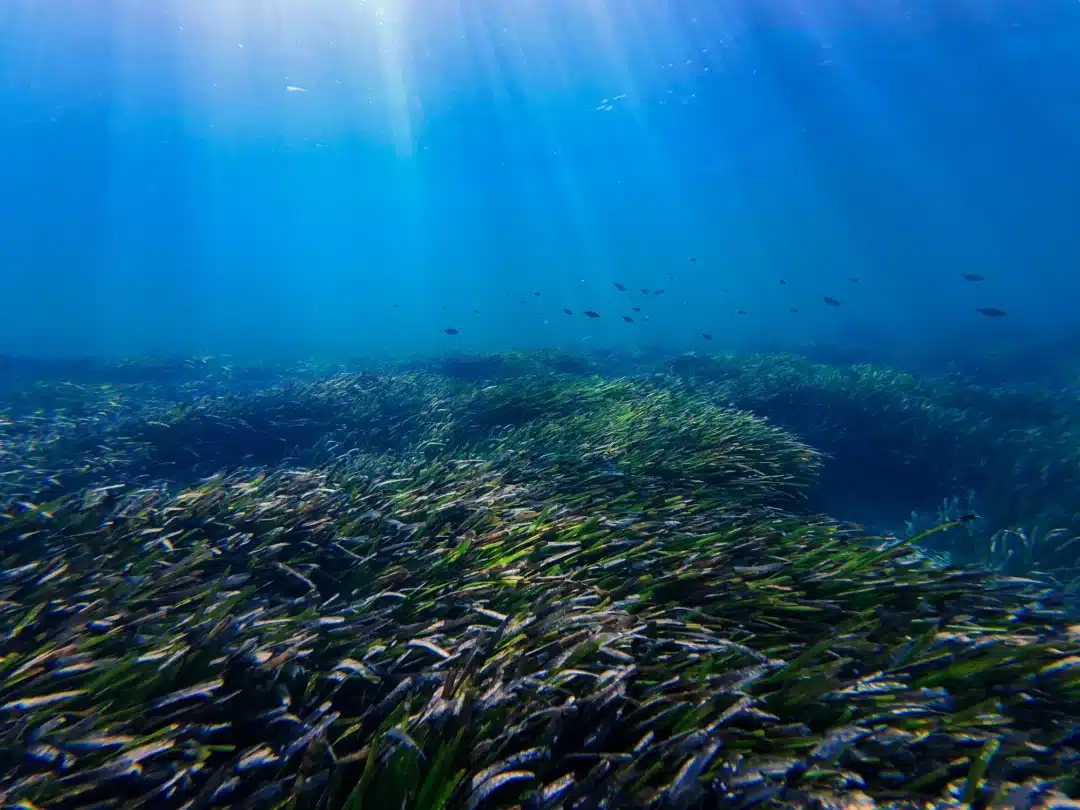
The Posidonia oceanica meadows also produce oxygen through photosynthesis, further enhancing the transparency of the water. These underwater fields are sometimes referred to as the “lungs of the Mediterranean” due to their ability to produce large quantities of oxygen, which supports both marine life and human enjoyment of the seas.
Ibiza and its neighbouring island, Formentera, are home to some of the largest and oldest Posidonia meadows in the Mediterranean. In fact, the Posidonia fields between the two islands are so important that they have been recognised as a UNESCO World Heritage Site, a testament to their ecological and environmental significance. The fact that these plants have been growing undisturbed for thousands of years is part of the reason Ibiza’s waters remain so remarkably blue and clean.
2. The reflection of the sky and depth of the sea
Another significant factor in the blue colour of Ibiza’s waters is the way sunlight interacts with the sea. When sunlight strikes the surface of the water, different wavelengths of light are absorbed and reflected. Water naturally absorbs colours from the red end of the light spectrum, leaving the blue and green wavelengths more visible to the human eye. As a result, the water reflects the sky’s blue light, which intensifies the blueness of the sea.
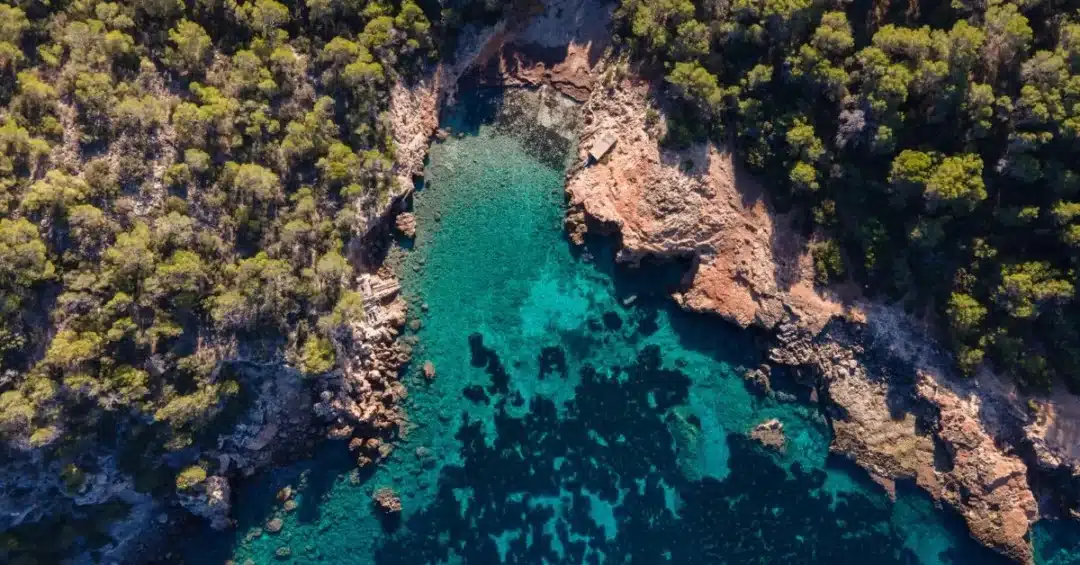
The depth of the water also plays a role in its appearance. Ibiza’s coastline features a variety of underwater topographies, from shallow sandy bays to deeper, rocky coves. In shallower waters, the light penetrates deeper and reflects off the sea floor, giving the water a lighter, turquoise hue. In deeper areas, the water appears a richer, darker blue because the light is absorbed before it can reflect off the sea floor. This creates a stunning variety of blue tones along Ibiza’s coastlines, from bright aquamarine in shallow areas to deep sapphire in the open sea.
3. Strict environmental protections
Another reason Ibiza’s waters remain so pristine and blue is the relatively low levels of pollution in the area. The Balearic Islands have long recognised the importance of preserving their natural beauty, not just for ecological reasons but also for tourism, which is one of the primary drivers of their economy. As a result, the local government has implemented strict environmental regulations to protect the marine environment.
Ibiza’s tourism industry has gradually shifted towards more sustainable practices, and many businesses and residents are conscious of the need to protect the island’s natural resources. Boats are mandated to use mooring buoys rather than anchoring directly onto the seabed. Furthermore, anchoring in Posidonia meadows is strictly prohibited and subject to significant fines. There are also restrictions on the types of pollutants that can enter the water, with strict penalties for those who violate these regulations. This commitment to environmental protection has ensured that Ibiza’s waters remain some of the cleanest and bluest in the Mediterranean.
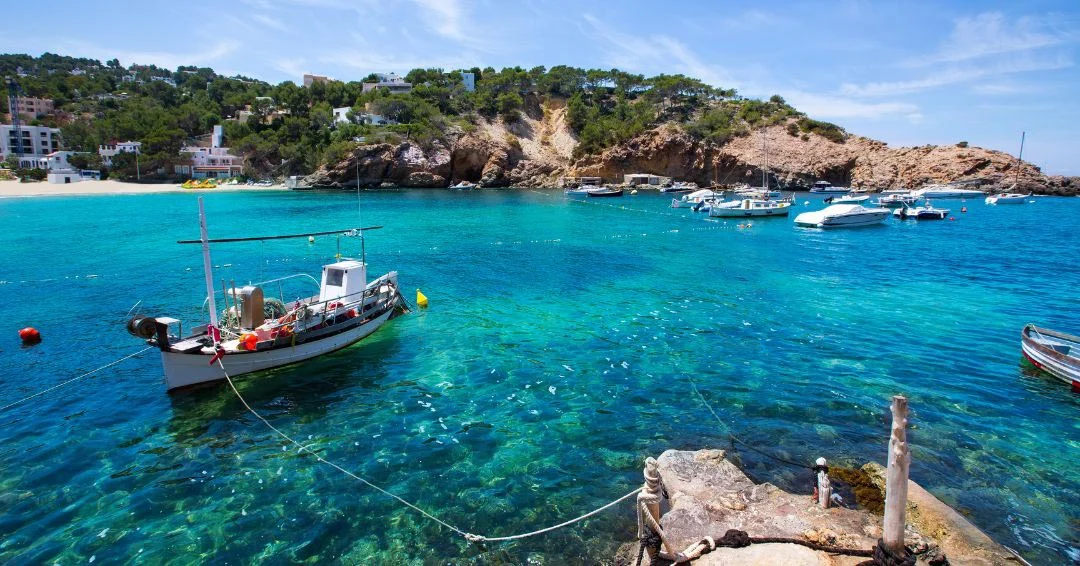
4. The influence of weather and winds
Ibiza’s location in the Mediterranean also plays a role in the clarity and colour of its waters. The island enjoys a warm, sunny climate for much of the year, with relatively little rainfall. This means that there are fewer runoffs of sediments and pollutants from the land into the sea. The prevailing winds, particularly the Tramontana wind from the north, help to keep the water clear by stirring it and preventing the accumulation of floating debris.
During the summer months, Ibiza’s seas are often calm and undisturbed, with only gentle breezes rippling the water’s surface. This calmness allows for greater transparency, making the waters appear even bluer and more inviting to swimmers and divers.
Ibiza’s mesmerising blue waters are the result of a combination of natural phenomena, from the filtering action of Posidonia oceanica to the reflection of the sky and the island’s geographical and environmental conditions. The island’s commitment to environmental protection has ensured that its waters remain some of the cleanest and most pristine in the Mediterranean, allowing future generations to enjoy its natural beauty. Whether viewed from the beach or a boat, the deep blue seas surrounding Ibiza continue to captivate all who visit, a testament to the island’s enduring allure.
